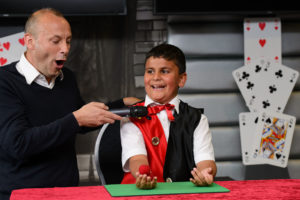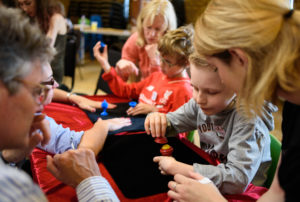Using magic to help children improve their health and wellbeing
Posted: 25th February 2021
 Ahead of this year’s Child Health Technology Conference, we look at some of the companies we’re working with who have developed programmes or products to help children. Today the spotlight is on the Breathe Magic programme designed to help young people with hemiplegia.
Ahead of this year’s Child Health Technology Conference, we look at some of the companies we’re working with who have developed programmes or products to help children. Today the spotlight is on the Breathe Magic programme designed to help young people with hemiplegia.
Breathe Arts Health Research design and deliver creative programmes, underpinned by scientific research, to improve health and wellbeing. It is a not-for-profit community interest company and one of the first arts and health organisations to be recognised by NHS England. Their work is co-designed with artists, scientists, healthcare staff and patients, to meet specific clinical and health needs.
The Breathe Magic Intensive Therapy programme is a clinically effective, fun and engaging approach to therapy. It is designed to help young people with hemiplegia, a weakness or paralysis affecting one side of the body caused by an injury to the brain. Grounded in world-class medical research, this award-winning approach gives young people access to 78 hours of intensive therapy AND transforms them into young magicians. Specialist occupational therapists work alongside Magic Circle magicians to teach magic tricks designed to develop hand and arm function, cognitive abilities, self-confidence and independence.
Breathe Arts Health Research are now piloting a programme which builds on the findings from the Breathe Magic Intensive Therapy Programme with Breathe Magic for Mental Health. This is a pioneering programme, using magic and performing arts to improve communication, social skills and self-efficacy for children and young people with mental health conditions. The project has been designed in collaboration with Magic Circle magicians, clinicians, child neurology academics and service-users.
 Why do Breathe use magic to improve mental health and wellbeing?
Why do Breathe use magic to improve mental health and wellbeing?
Magic is the art of body language and storytelling. To successfully perform magic, you need a detailed understanding of eye contact, directing your audience’s attention and confident storytelling. Contrastingly, children with mental health conditions avoid eye contact, can become shy and withdrawn and struggle socially. Participants take part in something engaging, fun and unusual, whilst learning tools and techniques that will last them a lifetime, building confidence, improving mental health and reducing symptoms.
Matthew Tulley, formerly the Director of Redevelopment at Great Ormond Street Hospital explains:
“Breathe Magic at GOSH is an inspiring development in healthcare. It takes a truly imaginative mind to link the skills of professional magicians to the many benefits learning magic tricks provide for our patients. Breathe Magic has not only demonstrated the clinical benefits of their work, they bring joy and happiness to everyone who gets to learn and perform a new skill in a fun environment.”
Find out more about Breathe Arts Health Research
